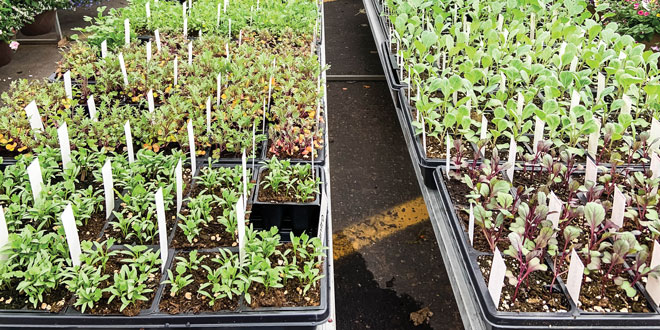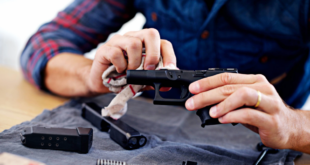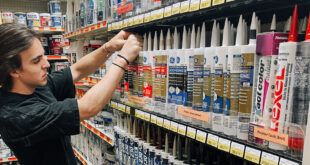From ice chippers to salsa, sauces to cat toys, Chocolay Ace Hardware in Marquette, Michigan, stocks a wide variety of locally made products. The store owners know that buying local is more than just a passing trend or feel-good move for customers; they are not only supporting the makers, but also the community. By selling locally made items, the store is showing its support for other local entrepreneurs.
Since opening in 2001, Chocolay Ace Hardware has been committed to supporting its local area. Selling locally made products in the store is just one way it has championed the community. Through the process, its owners have learned key factors for being successful sourcing and selling local products.
Adam Szczepanski co-owns the business with his wife, Molly Szczepanski, Molly’s sister, Nicole Mahaney, and Nicole’s husband, Antonio Ruiz. The group purchased the business from Nicole and Molly’s dad and his partner in 2016 and continued the mission of being active in the community.
Marquette is located in the Upper Peninsula (UP) of Michigan, home to Northern Michigan University, and is surrounded by several smaller towns. Residents of the UP take great pride in where they’re from, affectionately referring to themselves as “Yoopers.”
“Three of the four of us owners are Yoopers, raised in the UP, and we all love our community,” Adam Szczepanski says. “The big thing we wanted to do when we purchased the business was to be involved in our neighborhood and promote the Marquette area as much as we could.”
Expanding Their Selection
The store has always carried locally made products and initially only stocked items local makers brought to the owners. Seeing how local makers struggled during the COVID-19 pandemic made the owners of Chocolay Ace want to do more.
“When COVID-19 hit, we pivoted quickly, focused even more on the community and raised thousands for a local charity,” Szczepanski says. “We also supported our own employees with a monthly hazard bonus and any grants we received went back to our staff.”
Hanna Wingo, operations manager at Indian Trail Hardware, came up with the idea to host pop-up markets at her store in Indian Trail, North Carolina, nearly five years ago after seeing similar markets being promoted on Facebook. She started sourcing potential vendors by searching for local artisans on Etsy, an e-commerce website for handmade and vintage items, and reaching out to see if they’d be interested in taking part in the store’s pop-up markets.
“It was hard getting started because I didn’t have any connections to local craftspeople,” Wingo says. “Now, I don’t have to look anymore, the vendors reach out to me.”
The store now hosts five markets a year, each featuring 15 to 20 vendors, plus a dining option like a food truck or local restaurant selling food. Some events also include live entertainment. Wingo has a core group of vendors who attend nearly every market, and she also tries to include a variety of products for sale including soy candles, soap, pottery and jewelry. With a few exceptions, Wingo chooses only vendors who make their own products and don’t have a traditional storefront to sell their goods.
COVID-19 forced Wingo to cancel two of the pop-ups early in 2020, but the events restarted in August with a few adjustments.
“We were nervous about starting the markets back up, but thankfully they are open air and the vendors and the customers have been great about us asking them to wear masks and social distance,” says Wingo.
The markets have not only brought attention to the store and boosted sales, but have connected the store to the community. During the Christmas pop-up market in 2020, Wingo invited a new local coffee company to sell its coffee during the event. The store had just started selling that company’s whole beans, ground coffee and K-Cups.
“Adding it to the Christmas market got its name out in the community and it was nice to build that awareness for a new, local business,” Wingo says. “After the market, people who had tried the coffee came into our store to buy more. It was a nice win-win for both of us.”
Unlike many other local businesses, Chocolay Ace Hardware was able to stay open and remain profitable during the pandemic.
“There aren’t a lot of outlets for people to sell their products, and we want to share our space with local manufacturers, artists and other makers,” Szczepanski says. “A lot of our shoppers are cognizant of our attempts to be as community oriented as possible, and we want to show we’re following through with that.”
In January, Chocolay Ace Hardware posted on its Facebook page, asking for suggestions for what other locally made items it should carry in the store. Szczepanski says Facebook is the store’s preferred method of advertising because it better fits its clientele, which is primarily adults ages 35 to 65. It’s also cost-effective and easy to implement.
Szczepanski and the other store owners were impressed by how much traction the post received, garnering 51 comments and 89 shares in less than two weeks. The posts came from the customers of local makers touting their favorite items, as well as from the artisans themselves.
The owners were also excited by the variety of items people were suggesting, including winter hats, decorative copper ore slabs, honey, photography prints, candles, jewelry, dog leashes and cat toys.
Choosing the Right Mix
When it comes to deciding what products they’ll actually put in the store, Szczepanski says he and his team will go with their gut and choose a variety of items. In the past, they’ve picked products that correspond with their current product mix. For example, they sell locally made salsas, sauces and rubs that customers can buy to complement the grills the store sells.
Szczepanski says retailers who are looking to add locally made products to their inventory should also consider what customers in their area need. Being in the UP often brings snowy winters, so Chocolay Ace Hardware stocks ice chippers, a must-have for surviving the season.
Szczepanski recognizes that the locally made item might be more expensive, but those items might also come with perks. With the ice chippers the store sells, for example, the local fabricator offers free blade sharpening and a warranty with each one sold.
Last spring, Chocolay Ace Hardware stocked its greenhouse with all local, organic vegetable, fruit and herb starts for the first time. The store partnered with three local farmers who provided all the starts.
Selling fruit, vegetable and herb starts not only supported those nearby farmers, but provided a taste of the area to customers. This year, Chocolay Ace Hardware will be adding additional local greenhouse providers and expanding its selection of local plant starts. It will also offer a larger selection of annuals and hanging baskets.
When You Have to Say No
Thanks to the Facebook post asking for additional recommendations for local items to sell, Szczepanski has gotten more requests for items to stock than the store can handle right now.
“We’ve had a lot of items from crafters, but unfortunately, we can only take so much craft inventory because ultimately we’re a hardware store,” Szczepanski says.
If Szczepanski does have to say no to selling an item in the store, he will direct the makers to other local outlets for selling their items like farmers markets and craft shows.
“We want them to know that even though we can’t carry their item right now in our store, we still want them to succeed and try to provide other outlets where they can sell,” he says. Whether you currently carry local products or want to start, the key is listening to what your customers want and what t hey need.
“Our customers appreciate that we listen when they make suggestions for products,” says Szczepanski. “And we love when we can follow through.”
 Hardware Retailing The Industry's Source for Insights and Information
Hardware Retailing The Industry's Source for Insights and Information








